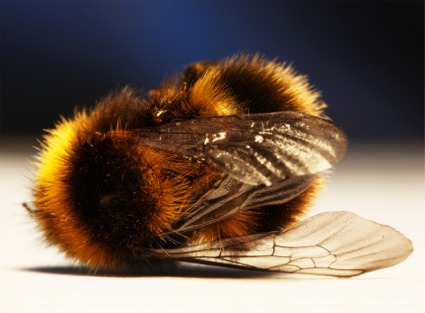
Insects are facing extinction all over the world, at a rate that bodes disastrous ecological collapse, reports the first global scientific review published in the journal Biological Conservation. (FranciscoSánchez-Bayo, Kris A.G.Wyckhuys, Worldwide decline of the entomofauna: A review of its drivers, Biological Conservation, Vol. 232, Apr. 2019)
More than 40% insect species are threatened with extinction and a third are endangered, according to the analysis. The rate of extinction is eight times faster than that of mammals, reptiles and birds. The total mass of insects is falling by 2.5% per year, that suggests with the best data available they could face total extinction within a century.
The planet is hurtling into the start of a sixth mass extinction with species losses reported in larger animals. Insects, difficult to study as they are, however are the most varied and abundant and outweigh humans by 17 times. They are a key component of all ecosystems as food for other animals, pollinators and nutrient recyclers.
While there have been reports on insect species loss in Germany and Puerto Rico, there had been no review on a global scale. The study, the first of its kind, strongly indicates that this is now a global crisis. The report asserts, “The trends confirm that the sixth major extinction event is profoundly impacting life forms on our planet… Unless we change our ways of producing food, insects as a whole will go down the path of extinction in a few decades,”. “The repercussions this will have for the planet’s ecosystems are catastrophic to say the least”, the report warns.
The analysis says intensive agriculture is the main driver of declines, particularly the heavy use of pesticides. It also adds agro-chemical pollutants, invasive species and climate change as driving factors of the extinction.
“If insect species losses cannot be halted, this will have catastrophic consequences for both the planet’s ecosystems and for the survival of mankind,” said Francisco Sánchez-Bayo, at the University of Sydney, Australia, who wrote the review with Kris Wyckhuys at the China Academy of Agricultural Sciences in Beijing.The 2.5% rate of annual loss over the last 25-30 years is “shocking”, Sánchez-Bayo said: “It is very rapid. In 10 years you will have a quarter less, in 50 years only half left and in 100 years you will have none.” (“Plummeting insect numbers threaten collapse of nature”, The Guardian, 10 Feb 2019)
Sánchez in the same interview said, many birds, reptiles, amphibians and fish eat insects and with this food source vanished they will starve to death.
Butterflies and moths have been the worst hit in this massacre. In England, the total abundance of butterfly species declined by 58% on farmed land between 2000 and 2009. (Andre S. Gilburn et. al., “Are neonicotinoid insecticides driving declines of widespread butterflies?”, 24 Nov. 2015). There have also been decline in bumble bees, honey bees and beetles. With the species loss the vacuum may be occupied by other adaptable species, but they are not enough to outweigh the lost numbers.
The report asserts that there must be changes to the ways of food production with less use of pesticides and chemicals. These detritus practices are more common in industrial agriculture that invariably produces food only for profit.
Loss of insect species will almost certainly invoke disastrous irrevocable repercussions on the global ecology, leading to more species extinction in larger animals, impeding pollination and thus leading flora and fauna species loss that will incur even more species loss. It will set off a chain reaction that will keep on aggravating and that too within a few decades.
Unless the current ways of production, that deliberately debilitates ecological integrity, is changed within a decade or so, there will be no going back from this impending disaster. The more the system depends on poisons to make food the more will it destroy all that binds nature together, insects being a key integral factor among those. This crisis is a distress call from the planet; and our survival may well depend on how fast we respond.
Omar Rashid Chowdhury is a practicing civil engineer. Hemajored in Environmental Engineering from Bangladesh University of Engineering and Technology (BUET).










































